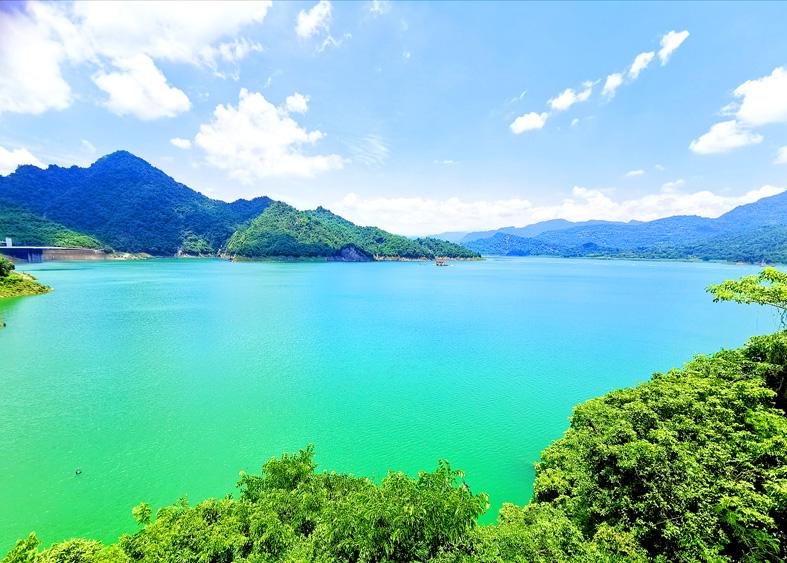Most of the 26 reservoirs on Taiwan’s outlying islands are affected by eutrophication, while five out of the 20 category-one reservoirs on Taiwan proper are also affected by eutrophication, an Environmental Protection Administration (EPA) report showed.
Eutrophication is caused by an excess of nutrients, which results in a buildup of plant life that prevents light and oxygen from entering the water.
In April, the Mingde (明德), Baihe (白河), Jingmian (鏡面), Chengcing Lake (澄清湖) and Fengshan (鳳山) reservoirs were the five category-one reservoirs with the most eutrophication, the report said.

Photo: Wu Chun-feng, Taipei Times
The Fengshan reservoir scored 70 on Carlson’s trophic state index, the highest out of the five, the EPA said, adding that there are 14 mesotrophic reservoirs.
The Feitsui Reservoir (翡翠水庫), which provides water for the Taipei metropolitan area, has the best water quality, and is also considered oligotrophic, the report said.
Of the six category-two reservoirs, the Sishi (西勢), Dapu (大埔) and Agongdian (阿公店) reservoirs are considered eutrophic, while the remaining three are mesotrophic, it said.
As for reservoirs on outlying islands, only the Sian (西安) reservoir in Penghu County is mesotrophic, while the other 25 are eutrophic, it said.
Mesotrophic water contains a moderate amount of nutrients, encouraging the growth of submerged aquatic plants, while oligotrophic water is clear and of higher quality.
Speaking about the report on Friday, Hou Chia-hung (侯嘉洪), a professor at National Taiwan University’s (NTU) Graduate Institute of Environmental Engineering, said that precipitation levels can affect the water quality of reservoirs.
Decreasing water levels can cause a higher-than-normal concentration of nitrogen and phosphorus in the water, resulting in an algae bloom, he said.
It is suspected that toxins from algae can negatively affect human health, and as 70 percent of water for civilian use originates from reservoirs, eutrophication is placing an increased burden on water filtration systems, he said.
As eutrophication decreases the amount of oxygen in the water, it further unbalances the ecology, Hou added.
EPA Department of Environmental Monitoring and Information Management Director-General Chang Shuenn-chin (張順欽) said that the eutrophication of reservoirs on islands was caused by their small size and lack of water inflows to prevent stagnation.
A lack of rainfall, as well as bird feces, also contribute to the eutrophication of reservoirs, he added.
The eutrophication of the Fengshan Reservoir was caused by its water being diverted to other places, and due to the natural water quality of the Gaoping (高屏) and Donggang (東港) rivers, Chang said, adding that a lack of rainfall last year was also a factor.
Hou said that changing how the land around the reservoirs is used is key to stabilizing reservoir water supply.
“We still have a long way to go in terms of environmental conservation and decreasing sources of pollutants,” he said.

An essay competition jointly organized by a local writing society and a publisher affiliated with the Chinese Communist Party (CCP) might have contravened the Act Governing Relations Between the People of the Taiwan Area and the Mainland Area (臺灣地區與大陸地區人民關係條例), the Mainland Affairs Council (MAC) said on Thursday. “In this case, the partner organization is clearly an agency under the CCP’s Fujian Provincial Committee,” MAC Deputy Minister and spokesperson Liang Wen-chieh (梁文傑) said at a news briefing in Taipei. “It also involves bringing Taiwanese students to China with all-expenses-paid arrangements to attend award ceremonies and camps,” Liang said. Those two “characteristics” are typically sufficient

The brilliant blue waters, thick foliage and bucolic atmosphere on this seemingly idyllic archipelago deep in the Pacific Ocean belie the key role it now plays in a titanic geopolitical struggle. Palau is again on the front line as China, and the US and its allies prepare their forces in an intensifying contest for control over the Asia-Pacific region. The democratic nation of just 17,000 people hosts US-controlled airstrips and soon-to-be-completed radar installations that the US military describes as “critical” to monitoring vast swathes of water and airspace. It is also a key piece of the second island chain, a string of

A magnitude 5.9 earthquake that struck about 33km off the coast of Hualien City was the "main shock" in a series of quakes in the area, with aftershocks expected over the next three days, the Central Weather Administration (CWA) said yesterday. Prior to the magnitude 5.9 quake shaking most of Taiwan at 6:53pm yesterday, six other earthquakes stronger than a magnitude of 4, starting with a magnitude 5.5 quake at 6:09pm, occurred in the area. CWA Seismological Center Director Wu Chien-fu (吳健富) confirmed that the quakes were all part of the same series and that the magnitude 5.5 temblor was

The Central Weather Administration has issued a heat alert for southeastern Taiwan, warning of temperatures as high as 36°C today, while alerting some coastal areas of strong winds later in the day. Kaohsiung’s Neimen District (內門) and Pingtung County’s Neipu Township (內埔) are under an orange heat alert, which warns of temperatures as high as 36°C for three consecutive days, the CWA said, citing southwest winds. The heat would also extend to Tainan’s Nansi (楠西) and Yujing (玉井) districts, as well as Pingtung’s Gaoshu (高樹), Yanpu (鹽埔) and Majia (瑪家) townships, it said, forecasting highs of up to 36°C in those areas